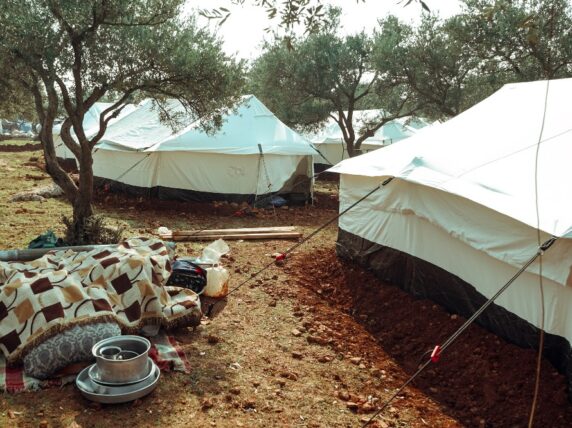How can INGOs prepare for future humanitarian crises?
The uncertainties Covid-19 foreshadows have intensified the long-term humanitarian implications of technological change.
The crisis will have added to INGOs’ responsibilities in at least one fundamental sense: their voice in the future must also be about the future.
INGOs must demonstrate not only how to mitigate the crises of the present, but also how to prepare for ever more complex and uncertain types of humanitarian crises in the future.
A complicated future
In another generation – let’s say 2040 – how might our vulnerability to new types of humanitarian crises and resistance to others change? To what extent, for example, will human capacities for identifying threats, such as pandemics, improve exponentially, as well as ways to create and prioritise solutions in a matter of hours?
Will our understanding of “urban” change as increasing reliance on ever more effective virtual communications becomes a growing norm? And, what will “urban” have to offer when the present pandemic has already demonstrated that employment, education and connectedness no longer rely on physical proximity?
The consequences of these shifts will be increasingly global: less and less confined to that outmoded distinction between a “Vulnerable South” and a “Resilient North”. Transformative technologies will influence human agency, human space and governance in ways that will herald new opportunities and could result in new types of humanitarian crises – far more impactful than even Covid-19.
Subscribe to our newsletter
Our weekly email newsletter, Network News, is an indispensable weekly digest of the latest updates on funding, jobs, resources, news and learning opportunities in the international development sector.
Get Network NewsNevertheless, the present global pandemic at least gives a sense of what the future might hold in certain fundamental ways. Crisis threats will become increasingly complex, and their origins and dynamics ever more uncertain. They will tend to spill over across regions, and more and more will reflect what scholars have labelled as “messes” 1
This doesn’t mean that we will only see crises from the perspective of global threats. Inevitably there will be events that will have local consequences. Yet, even here interdependencies and interlocking systems will frequently transcend most “geographical villages”. For example, the collapse of systems that affect money transfers or solar-based soil sensors for poor farmers, and that undermine “virtual doctors” for isolated rural medical centres, are just tips of icebergs that could emerge.
These exampes only begin to suggest the sorts of complexity and uncertainties that the future holds at even the most basic levels.
INGOs need to think about the future not as an extension of the past, but increasingly in terms of planning from the future. This has many dimensions, but there are three issues that should be of immediate concern for the INGO community.
1. Changing organisational behaviour
How many organisations spend time considering the “what might be’s”: plausible threats such as pandemics that might require different planning and operational approaches, and involve different types of vulnerabilities?
Organisations have to be more anticipatory and adaptative. Organisations will need to be willing to step outside their comfort zone to explore different types of “known knowns” – and even “unknown unknowns” – to test how adaptive they are to deal with uncertainty and complexity.
This is of particular relevance to the INGO community. INGOs will have to be sensitive to different types of disaster threats, to vulnerabilities that have few precedents, and to individuals and groups that are not normally associated with the crisis affected. And, here, Covid-19 offers a painfully good case in point.
2. New ways of collaboration
In preparing for the future, INGOs will also have to appreciate that new forms of collaborative networks will be essential for identifying and mitigating potential threats. It will become increasingly important for INGOs to find more effective ways of working in collaboration with social media, research institutions, the private sector, as well as standard governmental and intergovernmental organisations.
There are unfortunately too few examples of enduring inter-institutional collaboration that goes beyond exchange of information. Sadly, the first four months of Covid-19 have not stimulated that sort of action in any consistent and enduring ways.
In a world of increasing uncertainty and complexity, collaboration will require integrated systems and an appreciation of comparative advantage. It will also need a “common professional language” accessible to all collaborators, and common funding to ensure a coherent strategic and operational whole.
3. A voice for mobilisation
However, it is the third issue that ultimately will increasingly define the role of the INGO. The voice of the INGO of the future will have to be an essential factor in mobilising awareness on many levels about potential threats and mitigation.
Covid-19 has come at a time when the international community increasingly reflects an erosion of the international order, populism and ever-narrowing national self-interests. Now and in the future, INGOs will be desperately needed to mobilise the international community to recognise mutual self-interests globally. They will have to work at community levels, across conventional geo-political boundaries and at global levels to discuss, inform and promote new ways of preparing for uncertainty and complexity.
That INGO voice in the future – about the future – may be the enduring role which the INGO community needs to prepare to play even more strongly.
How can the UK INGOs embrace change to positively shape the future of the international development system? Sign up to our newsletter to hear about our upcoming report.
Footnotes
- Can M. Alpasalan and Ian I. Mitroff, Swans, Swine and Swindlers: Coping with the threat of Mega-crises and Mega-messes, Stanford Business Books, Stanford, California, 2011, p. XIV
Category
News & Views



